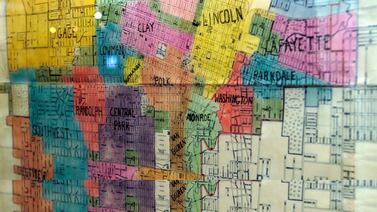Five people who were banned from Memphis-Shelby County Schools buildings and property have filed a federal lawsuit against the district, claiming officials violated their constitutional right to access public meetings.
The people banned are activists in Memphis who have called on the school board to increase transparency and integrity in its search for a new superintendent.
The lawsuit, filed in U.S. District Court on Tuesday, describes the activists as “the most vocal critics” of the “botched search for a new superintendent,” and alleges the district is “conspiring” to prevent their advocacy. The suit names both the school board of education and the district’s top security officer, Carolyn Jackson, as defendants.
The superintendent search has been on hold since mid-April, but the school board was set to make a series of pivotal votes to reactivate the search in another meeting Tuesday evening.
Activists LJ Abraham, Damon Curry Morris, Tikeila Rucker, Amber Sherman and Rachael Spriggs were each banned from district property days after a tense school board meeting in May that extended the pause on the superintendent search.
Abraham and Sherman are well-known activists in Memphis. Rucker is a former teacher union leader, and Spriggs is a former school board candidate. Morris, a candidate for Memphis City Council, is an advocate for students with disabilities.
District cited ‘disruptive behavior’ by activists
Memphis police and MSCS security officials issued the bans when some of the activists attempted to attend a meeting on May 12. Documents obtained by Chalkbeat from the City of Memphis show both the district and Memphis police signed off on most of the forms. The records include a copy of an MSCS public comment sign-in sheet for May 9, a few days before the bans, with asterisks next to each of the five people now banned.
The lawsuit calls the process of these bans unconstitutional and unlawful. The City of Memphis, in describing records produced for Chalkbeat, said police use the forms to warn someone they could be arrested for criminal trespassing.
Shelby County District Attorney Steve Mulroy told Chalkbeat in May that his office “will always uphold the law,” but that prosecution of the activists “will likely be of low priority for our office.” Mulroy said he talked to interim Superintendent Toni Williams and sought “an alternate way” to handle any issues with the activists.
The activists did not receive any information about why they were being banned when the forms were first issued on May 12. The district, in a statement, pointed to “disruptive behavior” and “threats to public safety,” plus activation of “panic alarms” during the May 9 meeting.
According to the suit, Abraham and Sherman dropped the noise-making devices, but “video of the incident shows no one was hurt” and “the meeting was only paused for a very brief period.”
The district released narrated security footage alleging Rucker and Spriggs coordinated with Abraham and Sherman, who dropped alarm devices, to disrupt the meeting.
In a letter to board members shared with the media, Jackson wrote that the office would be providing more information to the people who were banned and work to lift the ban. She said the district ordered the bans with the police department “as a safety measure.”
Rep. Justin Pearson defends activists
On Friday, four of the five people banned were denied entry to the school board office for another meeting about the superintendent search. Tennessee Rep. Justin Pearson, a Memphis Democrat who was expelled from the legislature for his role in a demonstration for gun control, joined the group in support.
Pearson said the activists, who call themselves the “School Board 5,” have provided a necessary “moral conscience” for the community. Pearson was reappointed to his seat, and is now running in an upcoming special election to retain his post.
“We’ve got to have some angelic dissenters that ensure that there is transparency in searches that are going to impact our kids for future generations,” Pearson said. “And that is what they have done.”
On Friday, MSCS board Chair Althea Greene said she felt “very confident” that the bans would be lifted, and hoped that would happen this week.
MSCS did not respond to Chalkbeat’s request for comment on the lawsuit late Tuesday. The activists are represented by attorneys Benjamin A. Gastel, Alyson S. Beridon and Scott A. Kramer.
Laura Testino covers Memphis-Shelby County Schools for Chalkbeat Tennessee. Reach Laura at LTestino@chalkbeat.org.








